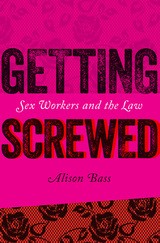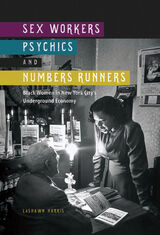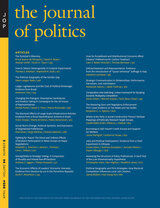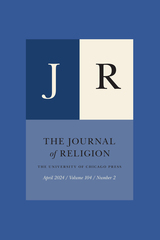3 books about Sex Workers

Getting Screwed
Sex Workers and the Law
Alison Bass
University Press of New England, 2015
Alison Bass weaves the true stories of sex workers with the latest research on prostitution into a gripping journalistic account of how women (and some men) navigate a culture that routinely accepts the implicit exchange of sex for money, status, or even a good meal, but imposes heavy penalties on those who make such bargains explicit. Along the way, Bass examines why an increasing number of middle-class white women choose to become sex workers and explores how prostitution has become a thriving industry in the twenty-first-century global economy. Situating her book in American history more broadly, she also discusses the impact of the sexual revolution, the rise of the Nevada brothels, and the growing war on sex trafficking after 9/11. Drawing on recent studies that show lower rates of violence and sexually transmitted diseases, including HIV, in regions where adult prostitution is legal and regulated, Bass makes a powerful case for decriminalizing sex work. Through comparisons of the impact of criminalization vs. decriminalization in other countries, her book offers strategies for making prostitution safer for American sex workers and the communities in which they dwell. This riveting assessment of how U.S. anti-prostitution laws harm the public health and safety of sex workers and other citizens—and affect larger societal attitudes toward women—will interest feminists, sociologists, lawyers, health-care professionals, and policy makers. The book also will appeal to anyone with an interest in American history and our society’s evolving attitudes toward sexuality and marriage.
[more]

Red Lights
The Lives of Sex Workers in Postsocialist China
Tiantian Zheng
University of Minnesota Press, 2009
In China today, sex work cannot be untangled from the phenomenon of rural-urban migration, the entertainment industry, and state power. In Red Lights, Tiantian Zheng highlights the urban karaoke bar as the locus at which these three factors intersect and provides a rich account of the lives of karaoke hostesses—a career whose name disguises the sex work and minimizes the surprising influence these women often have as power brokers.
Zheng embarked on two years of intensely embedded ethnographic fieldwork in her birthplace, Dalian, a large northeastern Chinese seaport of over six million people. During this time, Zheng lived and worked with a group of hostesses in a karaoke bar, facing many of the same dangers that they did and forming strong, intimate bonds with them. The result is an especially engaging, moving story of young, rural women struggling to find meaning, develop a modern and autonomous identity, and, ultimately, survive within an oppressively patriarchal state system.
Moving from her case studies to broader theories of sex, gender, and power, Zheng connects a growth in capitalist entrepreneurialism to the emergence of an urban sex industry, brilliantly illuminating the ways in which hostesses, their clients, and the state are mutually created in postsocialist China.
Zheng embarked on two years of intensely embedded ethnographic fieldwork in her birthplace, Dalian, a large northeastern Chinese seaport of over six million people. During this time, Zheng lived and worked with a group of hostesses in a karaoke bar, facing many of the same dangers that they did and forming strong, intimate bonds with them. The result is an especially engaging, moving story of young, rural women struggling to find meaning, develop a modern and autonomous identity, and, ultimately, survive within an oppressively patriarchal state system.
Moving from her case studies to broader theories of sex, gender, and power, Zheng connects a growth in capitalist entrepreneurialism to the emergence of an urban sex industry, brilliantly illuminating the ways in which hostesses, their clients, and the state are mutually created in postsocialist China.
[more]

Sex Workers, Psychics, and Numbers Runners
Black Women in New York City's Underground Economy
LaShawn Harris
University of Illinois Press, 2016
During the early twentieth century, a diverse group of African American women carved out unique niches for themselves within New York City's expansive informal economy. LaShawn Harris illuminates the labor patterns and economic activity of three perennials within this kaleidoscope of underground industry: sex work, numbers running for gambling enterprises, and the supernatural consulting business. Mining police and prison records, newspaper accounts, and period literature, Harris teases out answers to essential questions about these women and their working lives. She also offers a surprising revelation, arguing that the burgeoning underground economy served as a catalyst in working-class black women ™s creation of the employment opportunities, occupational identities, and survival strategies that provided them with financial stability and a sense of labor autonomy and mobility. At the same time, urban black women, all striving for economic and social prospects and pleasures, experienced the conspicuous and hidden dangers associated with newfound labor opportunities.
[more]
READERS
Browse our collection.
PUBLISHERS
See BiblioVault's publisher services.
STUDENT SERVICES
Files for college accessibility offices.
UChicago Accessibility Resources
home | accessibility | search | about | contact us
BiblioVault ® 2001 - 2024
The University of Chicago Press









